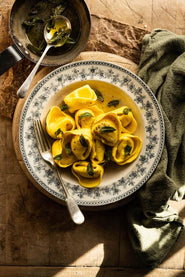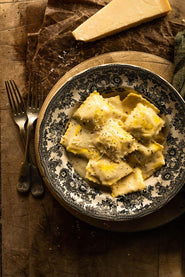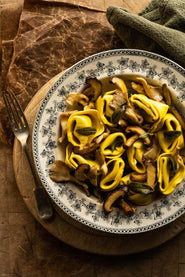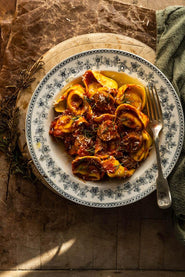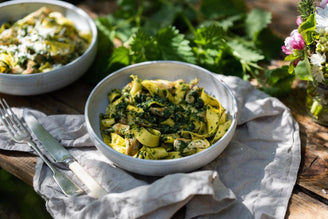Pastificio Carleschi is an artisan producer of organic pasta made using traditional Italian methods and British stoneground flour from heritage grain varieties.
Founded by Giovanni Carleschi in 2019, Pastificio Carleschi – ‘Pastificio’ meaning pasta factory and ‘Carleschi’ being Giovanni’s family name – have taken years to perfect their method of making pasta. They focus on bronze-cut pasta, slow dried at a low temperature, and using British heritage grains sourced from some of the most regenerative-minded farmers and millers in the UK.
Unlike commercially-made pasta, which is dried very quickly at a hot temperature, Pastificio Carleschi heats their pasta very slowly and always below 55 degrees Celsius. This slow process dries the pasta from the core outwards, allowing the pasta to gradually reabsorb the pasta water when cooking, whilst keeping its texture throughout. This slow, gradual drying process also keeps the nutritional balance of the pasta intact, specifically the essential oils and vitamins, which are essential in expressing the grain’s natural flavours.

Whether it is produced on a commercial-scale, or small-scale as with Pastificio Carleschi, dry pasta is incredibly difficult to make. Industrial-made pasta demands that the characteristics of the wheat grain be the same for every batch, which promotes an intensive farming system and a monoculture that inhibits soil fertility. Pastificio Carleschi, however, focuses on producing small batches of pasta and working with farmers who are actively looking to enhance the health of the soil and environment whilst producing their heritage grains. For example, Giovanni works with Abi Aspen Glencross at Duchess Farms, who are growing a unique blend of heritage grains for Pastificio Carleschi at their farm in Hertfordshire.
Before founding Pastificio Carleschi, Giovanni founded his first company, called ‘Seriously Italian’, which taught traditional Italian dishes at home, including making fresh pasta using British flour and British eggs. To source his ingredients for the dishes, Giovanni would visit farmer’s markets, where he would meet British farmers and millers who suggested to him to use their heritage grains in his pasta making.
Over the following years, Giovanni befriended a number of these farmers who were experimenting with newly developed heritage grains, such as, Emmer, Einkorn, and Spelt. Giovanni has previously worked with the likes of Andrew Wilkinson from Gilchesters Organics, and now collaborates with Hodmedod’s and the farmers they work with.

Where do you source your heritage grains?
“We source as much as we can from farmers direct, mostly organic certified farmers but all that are working towards an extensive farming system. We also source from millers that work with these types of farmers. Many farmers have bought millstones themselves so that’s always helpful to buy the flour direct from the farms. Alongside the heritage wheat varieties, we source fava beans straight from Hodmedod’s to make our Emmer & Fava Bean Sedani Rigati. This pasta has a great flavour and is packed with health benefits, with high levels of protein and fibre from the legumes. Hodmedod’s now have their own mill to grind their farmer’s grains, so that’s a great help!” – Giovanni Carleschi
Pastificio Carleschi often pre-order grains and flour from their farmers in order to support their work towards growing heritage grains. For example, they have pre-ordered a tonnage of Einkorn from Duchess Farms that hasn’t been harvested yet. Even before the pasta making begins, Giovanni has a close relationship with the farmers and millers to make sure the growing stage and harvest has gone well.
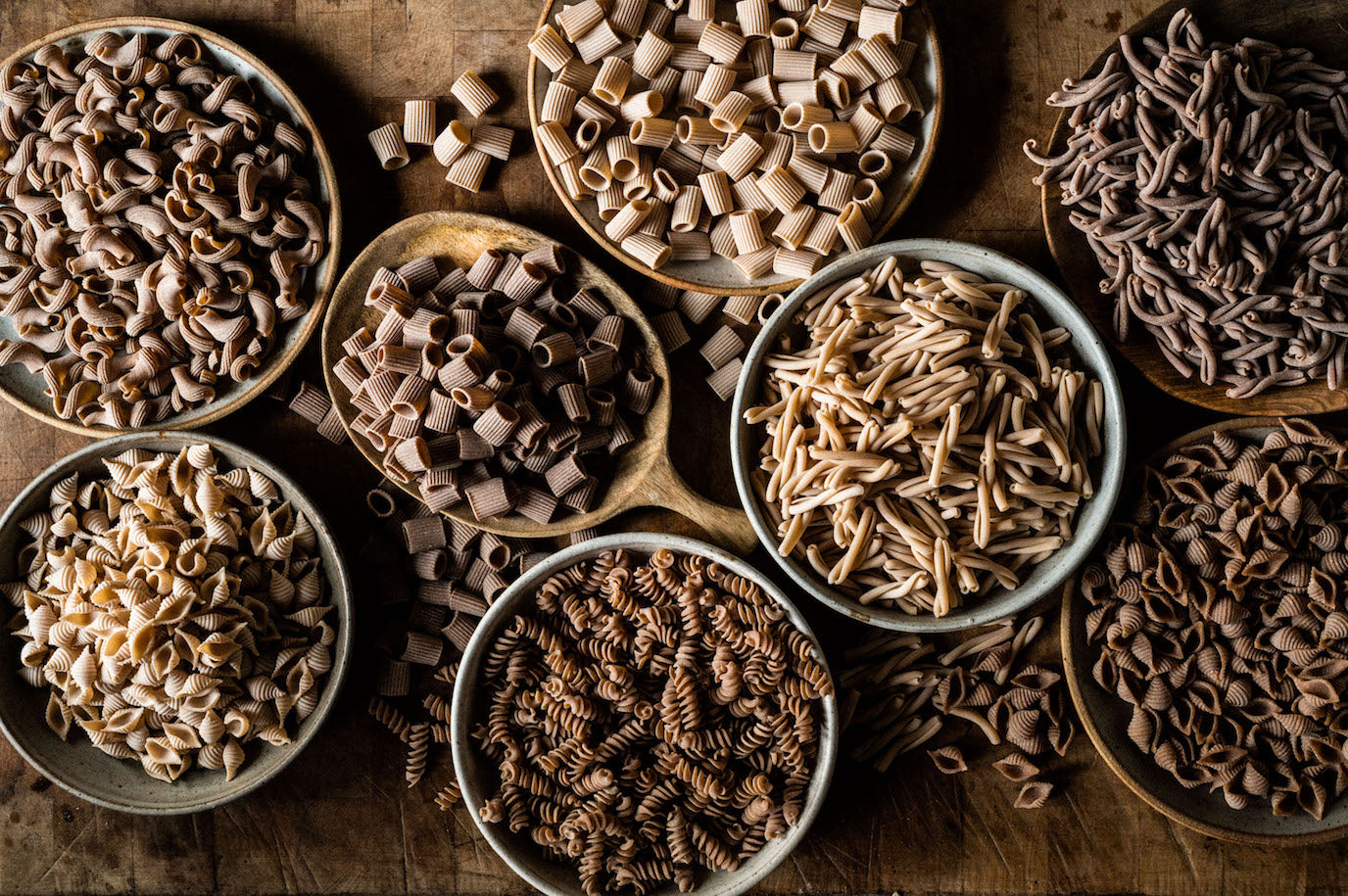
How is Pastificio Carleschi’s pasta made?
Perhaps the most important aspect of the whole process is to source the right ingredients, and for those ingredients to be milled in the correct way for the pasta to have taste and texture.
The first stage is to mix the flour with water to create a dough. The dough is then pressurised through a machine and cut into a prepared pasta shape. Pastificio Carleschi ‘bronze-cut’ their pasta, which means their pasta dough is pressed through a bronze surface – commercial machines often use a Teflon coating. This traditional ‘bronze-cut’ method of making pasta results in the pasta having a softer, coarser shell for the pasta sauce to easily adhere.
After the pasta has been shaped and cut, it is dried. There are two types of dryers in the pasta making process; the first, a dynamic dryer that heats high and quickly, and the second, a static dryer that dries slowly and is commonly used by artisans.

Pastificio Carleschi uses a static dryer with a series of wooden shelves encased. The pasta shapes are then placed onto the wooden trays and dried – depending on the shape and size of the pasta, this can take up to 40 hours from start to finish. Ventilation, humidity extraction, temperature, and time to rest, are all important aspects to consider when drying.
Giovanni notes that if all of these aspects are done correctly, the pasta should have a long cooking time (at least 8 minutes) to allow the pasta to cook through slowly. When cooking pasta, Giovanni notes to test the pasta often to make sure the ‘al dente’ feel is created, “And, don’t forget that pasta also keeps cooking even whilst on the plate!”

From working with farmers and millers that focus on land regeneration to using the traditional ‘bronze-cut’ method of pasta making, Pastificio Carleschi is all about blending the best of British and Italian heritage to make their pasta. They also support British artisans, for example, the sieves they use in their pasta making process are made in the traditional manner by Steve Overthrow in Somerset.
Pastificio Carleschi packet their pasta in plastic-free, compostable bags and seal them with paper labels. Pastificio Carleschi aims to make the lowest possible impact on the environment whilst making delicious traditional pasta.

